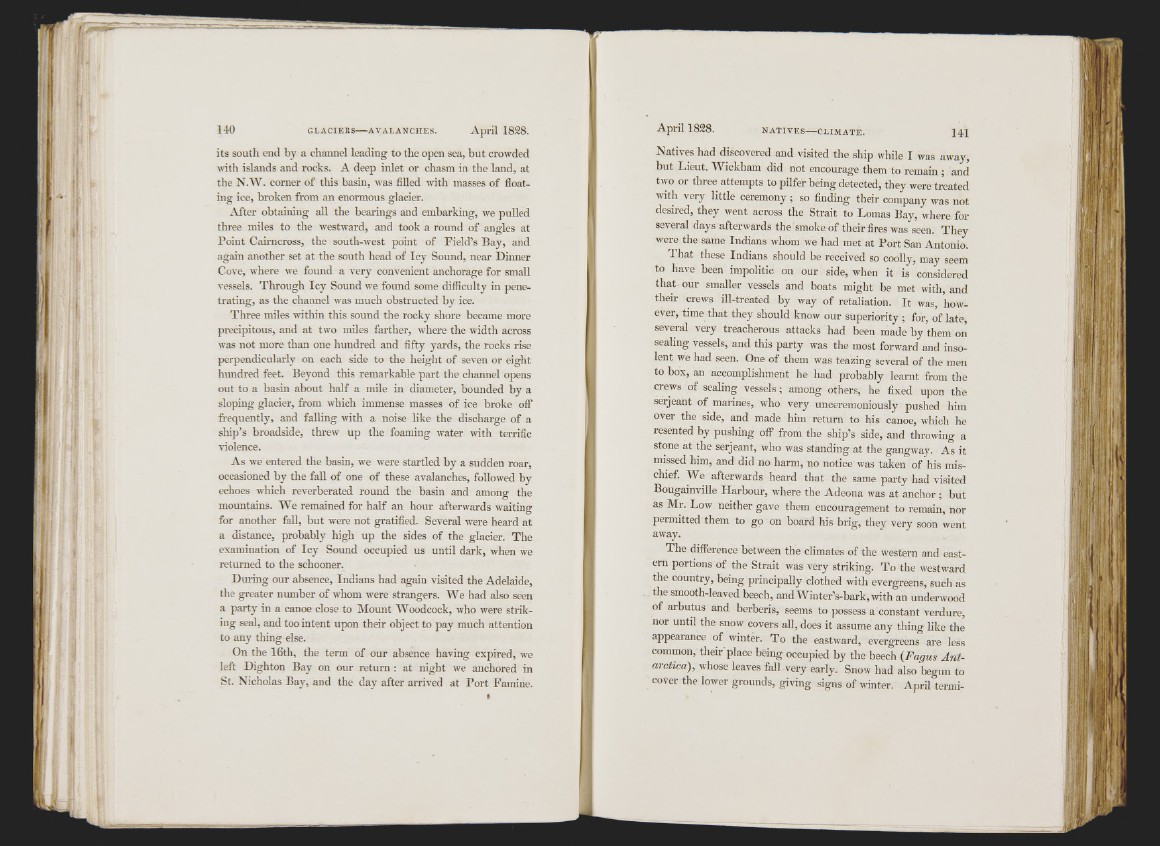
! tí
140 April 18.28.
its south end by a channel leading to the open sea, but crowded
witli islands and rocks. A deep inlet or chasm in the land, at
the N.W. corner of this basin, was fiUed with masses of floating
ice, broken from an enormous glacier.
After obtaining all the bearings and embarking, we pulled
three miles to the westward, and took a round of angles at
Point Caii-ncross, the south-west point of Field’s Bay, and
again another set at the south head of Icy Sound, near Dinner
Cove, where we found a very convenient anchorage for small
vessels. Through Icy Sound we found some difficulty in penetrating,
as the channel was much obstructed by ice.
Three miles -within this sound the rocky shore became more
precipitous, and at two miles farther, where the width across
was not more than one hundred and fifty yards, the rocks rise
perpendicularly on each side to the height of seven or eight
hundred feet. Beyond this remarkable part the channel opens
out to a basin about half a mile in diameter, hounded by a
sloping glacier, from which immense masses of ice broke off
frequently, and falling with a noise like the discharge of a
ship’s broadside, threw up the foaming water with terrific
violence.
As we entered the basin, we were startled by a sudden roar,
occasioned by the faU of one of these avalanches, followed by
echoes -which reverberated round the basin and among the
mountains. We remained for half an hour afterwards waiting
for another fall, but were not gratified. Several were heard at
a distance, probably high up the sides of the glacier. The
examination of Icy Sound occupied us until dark, when we
returned to the schooner.
During our absence, Indians had again visited the Adelaide,
the greater number of whom were strangers. We had also seen
a party in a canoe close to Mount Woodcock, who were striking
seal, and too intent upon their object to pay much attention
to any thing else.
On the 16th, the term of our absence having expired, we
left Dighton Bay on our return : at night we anchored in
St. Nicholas Bay, and the day after arrived at Port Famine.
Natives had discovered and visited the ship while I was away,
but Lieut. Wickham did not encourage them to remain ; and
two or three attempts to pilfer being detected, they were treated
with very little ceremony; so finding their company was not
desired, they went across the Strait to Lomas Bay, wliere for
several days afterwards the smoke of their fires was seen. They
were the same Indians whom we had met at Port San Antonio.
That these Indians should be received so coolly, may seem
to have heen impolitic on our side, when it is considered
that, our smaller vessels and boats might be met with, and
their crews ill-treated by way of retaliation. It was, how’-
ever, time that they should know our superiority ; for, of late,
several very treacherous attacks had been made by them on
sealing vessels, and this party was the most forward and insolent
we had seen. One of them was teazing several of the men
to box, an accomplishment he had probably learnt from the
crews of sealing vessels; among others, he fixed upon the
Serjeant of marines, who very unceremoniously pushed him
over the side, and made him return to his canoe, which he
resented by pushing off from the ship’s side, and throwing a
stone at the serjeant, who was standing at the gangway. As it
missed him, and did no harm, no notice was taken of his mischief.
We afterwards heard that the same party had visited
Bougainville Harbour, where the Adeona was at anchor; but
as Mr. Low neither gave them encouragement to remain, nor
permitted them to go on board his brig, they very soon went
away.
The difference between the climates of the western and eastern
portions of the Strait was very striking. To the westward
the country, being principally clothed with evergreens, such as
the smooth-leaved beech, and Winter’s-bark, with an underwood
of arbutus and berberis, seems to possess a constant verdure,
nor until the snow covers all, does it assume any thing like the
appearance of winter. To the eastward, evergreens are less
common, their place being occupied by the beech {Fagus A n tarctica),
whose leaves fall very early. Snow had also begun to
cover the lower grounds, giving signs of winter. April termi